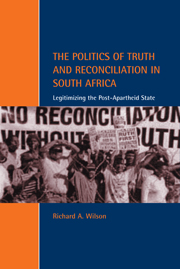Book contents
- Frontmatter
- Contents
- List of Acronyms and Glossary
- Maps
- Preface and Acknowledgements
- 1 Human Rights and Nation-Building
- PART I Human Rights and Truth
- PART II Reconciliation, Retribution and Revenge
- 4 Reconciliation Through Truth?
- 5 Reconciliation in Society: Religious Values and Procedural Pragmatism
- 6 Vengeance, Revenge and Retribution
- 7 Reconciliation with a Vengeance
- 8 Conclusions: Human Rights, Reconciliation and Retribution
- Notes
- Bibliography
- Index
4 - Reconciliation Through Truth?
Published online by Cambridge University Press: 10 November 2009
- Frontmatter
- Contents
- List of Acronyms and Glossary
- Maps
- Preface and Acknowledgements
- 1 Human Rights and Nation-Building
- PART I Human Rights and Truth
- PART II Reconciliation, Retribution and Revenge
- 4 Reconciliation Through Truth?
- 5 Reconciliation in Society: Religious Values and Procedural Pragmatism
- 6 Vengeance, Revenge and Retribution
- 7 Reconciliation with a Vengeance
- 8 Conclusions: Human Rights, Reconciliation and Retribution
- Notes
- Bibliography
- Index
Summary
Reconciliation has come to occupy a special place in human rights talk in newly democratizing countries, particularly within transitional institutions such as truth commissions. Reconciliation is not a term with any legal standing, like ‘proportionality’ or ‘gross human rights violation’, which is one reason why many lawyers in South Africa object to its prevalence in transitional human rights talk. Like the term ubuntu, reconciliation has had a particular role to play in blending human rights talk into a new nation-building project after the demise of apartheid. In the transitional era, reconciliation discourse mitigated the crisis of legitimacy caused by granting amnesty to torturers and entering into a power-sharing arrangement with former apartheid leaders.
Indemnity from criminal prosecution for human rights violators was the price paid by opposition parties in El Salvador, Guatemala, Chile, Argentina, Uruguay and South Africa to persuade authoritarian regimes to relinquish their death grip on society and state. Each transition has ushered in more democratic governments, yet at the cost of not pursuing entrenched terror networks through the courts. While exalting a new ‘culture of human rights’ and rational rule of law, new political leaders wrap their complicity within the sophistry of reconciliation talk. Reconciliation was the Trojan horse used to smuggle an unpleasant aspect of the past (that is, impunity) into the present political order, to transform political compromises into transcendental moral principles.
- Type
- Chapter
- Information
- The Politics of Truth and Reconciliation in South AfricaLegitimizing the Post-Apartheid State, pp. 97 - 122Publisher: Cambridge University PressPrint publication year: 2001

